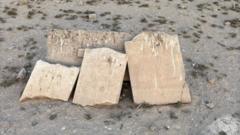Can One Man Restore Iraq's Commonwealth War Graves?

Published: 2025-11-09 02:00:16 | Category: technology
This Remembrance Sunday, Ben Soppitt will pay tribute to his grandfather at Basra War Cemetery in Iraq, underscoring the neglect faced by Commonwealth war graves in the region. His small ceremony contrasts sharply with the grand commemorations at the Cenotaph in London, highlighting what he perceives as the Commonwealth War Graves Commission's (CWGC) failure to honour those who sacrificed their lives in Iraq. More than 50,000 soldiers from the UK and Commonwealth lost their lives in Iraq during both World Wars, many of whom remain unrecognised in disrepair or forgotten graves.
Last updated: 12 November 2023 (BST)
What’s happening now
This year, Ben Soppitt will honour his grandfather, Gunner Joseph Soppitt, who died in 1941 while British forces were stationed in Iraq during World War Two. The ceremony at Basra War Cemetery will be a poignant reminder of the neglect felt by many families of soldiers buried in Iraq. The CWGC has faced criticism for failing to maintain the graves and memorials in Iraq, with many sites left abandoned, vandalised, or overtaken by local activities.
Key takeaways
- Ben Soppitt will commemorate his grandfather at Basra War Cemetery this Remembrance Sunday.
- More than 50,000 UK and Commonwealth soldiers died in Iraq during both World Wars, many without proper recognition.
- The CWGC has been accused of neglecting war graves in Iraq, with many sites in disrepair.
Timeline: how we got here
The neglect of war graves in Iraq has a long history, with significant milestones including:
- 1941: Gunner Joseph Soppitt dies in Iraq during World War Two.
- 1990s: The CWGC withdraws from Iraq due to security concerns.
- 2007: Baroness Emma Nicholson highlights the state of CWGC sites during her visit.
- 2023: Ben Soppitt begins documenting the state of CWGC sites in Iraq, calling for greater action.
What’s new vs what’s known
New today/this week
As Ben Soppitt prepares for his small ceremony, he has been vocal about the deteriorating condition of war graves in Iraq, sharing his findings on social media. His recent visits have revealed a lack of maintenance and recognition for those buried in CWGC sites.
What was already established
It is well-documented that the CWGC has faced challenges in maintaining sites in Iraq since the 1990s. Many families have expressed frustration over the lack of visible markers or memorials for their loved ones, especially given the scale of casualties suffered during the World Wars.
Impact for the UK
Consumers and households
For families of those who served and died in Iraq, the state of the graves is a painful reminder of loss. The lack of proper commemoration can impact their sense of closure and connection to their loved ones' sacrifices.
Businesses and jobs
The neglect of war graves in Iraq may also affect tourism and local businesses linked to historical sites. If the CWGC were to enhance its efforts in restoration, it could lead to increased interest and visits from those wanting to pay their respects.
Policy and regulation
The CWGC operates under guidelines set forth by the UK government, particularly regarding safety and security in Iraq. The ongoing travel advice from the Foreign Office, which currently discourages travel to Iraq, complicates efforts to restore and maintain these sites.
Numbers that matter
- 50,000+: Total soldiers from the UK and Commonwealth who died in Iraq during both World Wars.
- 3,000: Approximate number of men buried at Basra War Cemetery, many without official markers.
- 7,385: Names listed on the nearby Basra War Memorial, commemorating British personnel and Indian officers.
Definitions and jargon buster
- CWGC: Commonwealth War Graves Commission, responsible for the commemoration of Commonwealth military personnel who died in the two World Wars.
How to think about the next steps
Near term (0–4 weeks)
In the immediate future, attention will remain on Ben Soppitt's ceremony in Basra and the ongoing discussions regarding the condition of war graves in Iraq. Advocacy for the CWGC to take action could increase during this time.
Medium term (1–6 months)
As more families and advocates highlight the issue, the CWGC may face pressure to expedite restoration plans. A growing public interest could lead to potential funding or support for these efforts.
Signals to watch
- Updates from the CWGC regarding their restoration plans and timelines.
- New travel advice from the Foreign Office that may affect operations in Iraq.
- Public responses and advocacy efforts surrounding the commemoration of soldiers in Iraq.
Practical guidance
Do
- Support campaigns advocating for better recognition of fallen soldiers in Iraq.
- Engage with local MPs to raise awareness of the CWGC's responsibilities.
Don’t
- Ignore the plight of families seeking closure and recognition for their loved ones.
- Assume that the CWGC is not taking any action; they do have plans, albeit slow-moving.
Checklist
- Research the history of the CWGC and its sites in Iraq.
- Follow Ben Soppitt’s updates on social media for insights on current conditions.
- Consider reaching out to advocacy groups focused on war memorials.
- Stay informed about government announcements regarding travel and safety in Iraq.
Risks, caveats, and uncertainties
The situation regarding war graves in Iraq remains highly fluid, with security concerns making restoration efforts complex. Additionally, the CWGC's long-term plans may change depending on evolving political and security dynamics in the region. Families may also face emotional challenges as they navigate the commemoration of their loved ones amid such neglect.
Bottom line
The neglect of war graves in Iraq poses an ongoing challenge for the CWGC and the families of those who served. As Ben Soppitt's personal campaign highlights, there is a pressing need for action to honour the fallen properly. The push for recognition and restoration may gain traction, urging the CWGC to resume its work in Iraq.
FAQs
What is the Commonwealth War Graves Commission (CWGC)?
The CWGC is an organisation responsible for the commemoration of Commonwealth military personnel who died during the World Wars, ensuring their graves are maintained and properly marked.
Why is Ben Soppitt's ceremony significant?
Ben Soppitt's ceremony is significant as it highlights the neglect of war graves in Iraq, drawing attention to the broader issue of how fallen soldiers are commemorated and recognised.
What steps are being taken to restore war graves in Iraq?
The CWGC has stated it has plans for restoration, but progress is hampered by security concerns and travel advisories, making work in Iraq complicated.



